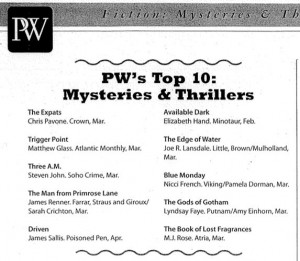
That’s what the fine folks over at Publishers Weekly think. And who am I to argue? Thank you!
Author: admin (Page 13 of 14)
James Renner is an award-winning journalist, and author of True Crime Addict, the definitive book on the Maura Murray disappearance. He also hosts the podcast, The Philosophy of Crime. In 2019, he founded The Porchlight Project which raises money for new DNA testing and genetic genealogy for Ohio cold cases. In May, 2020, James Zastawnik was arrested for the murder of Barbara Blatnik, thanks to the work of genealogists funded by the Porchlight Project.
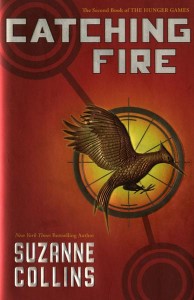 Okay, so I’m officially caught up in the Hunger Games trilogy, now. Can’t wait to pick up the third book tonight!
Okay, so I’m officially caught up in the Hunger Games trilogy, now. Can’t wait to pick up the third book tonight!
The first book is a masterpiece. And there is much that I love about this second story, Catching Fire. It is, after all, the Empire Strikes Back of the trilogy. Katniss, fresh off her victory in the Hunger Games, finds herself unwittingly the symbol of rebellion in this post-apocalyptic world where the Capitol rules over 12 separated Districts. The stakes are raised when President Snow announces that the 75th Games will be a special “quarter quell” in which previous Hunger Games winners will face off against each other. Really, though, its a clever ploy to publicly kill Katniss and squash the rebellion. And when we get to the games (finally) the book becomes impossible to put down.
Collins is an expert at foreshadowing and misdirection. She’s a magician of a writer, able to surprise even the most cynical readers. And, make no mistake, surprising a reader is a VERY hard and daring thing to pull off. If you fuck it up, your reader ends up hating you because it seems condescending.
So, yes, I like this book. However, it takes its time getting to the action. The first hundred and fifty pages is a lot of meandering. In some ways it reminded me of the first half of the last Harry Potter book. We don’t have a feel for where the narration is taking us and that feels disconcerting. The only reason, I think, that we hang in there is because we trust Collins as an author. We know she’ll get take us somewhere nice soon. And that seems just a bit like cheating.
My hunch is that the meandering beginning of Catching Fire is actually an attempt by Collins to foreshadow aspects of the final volume. In some ways, Empire did this, too. All second parts do this when the author knows it will be a trilogy, I guess. We’ll see.
There was really only one place in the novel that seemed like a missed opportunity, though. (SPOILER COMING). When Peeta’s heart stops beating, I wanted the cannon to sound. That would have been cool.
 I really don’t need to tell you to read this. Most likely, you already have. I’m coming to the games a bit late, myself.
I really don’t need to tell you to read this. Most likely, you already have. I’m coming to the games a bit late, myself.
What the hell took you so long, Renner? Well, I was afraid it might be another Twilight. I recognized a similar fervor from my younger sisters centered around this series of novels and avoided it like the plaque for a bit. But then adults I knew started talking about it. The same ones who trashed Twilight (for good reason) were singing four-note praises for The Hunger Games. Still, it wasn’t until I watched the trailer for the movie, featuring Jennifer Lawrence (who I’ve been in love with since Winter’s Bone), that I finally jumped in.
The book is like butter. Smooth writing all the way through. Tight without being condescending. Epic without being self-important. There are simply no narrative mistakes. It’s a master work.
The story, itself, seems both familiar and new: in a post-apocalyptic world, children fight to the death in a televised game to win food and fame. We see the world through the eyes of Katniss Everdeen, a young woman from District 12, who volunteers to participate in the games in place of her younger sister. It’s a stark distopian tale, in the vein of Logan’s Run and The Running Man. But it’s also a love story (natch) and a commentary on our reality-TV and social networking-obsessed culture. It’s told in the present tense, which I normally hate with the white hot intensity of a thousand suns, but it works well, here, as if Katniss has invited us along for the journey and is simply narrating the action for us.
If I have one critique, it’s that too many of the deaths occur off stage. This is, after all, a violent game and by constantly averting our eyes, the thematic punch is pulled a bit. But the book is marketed toward teens, so I guess that’s forgivable.
Whatever. I loved it. And I can’t wait to finish the series!
 I read It when I was in the 4th grade. I toted that gargantuan book–the one with the monster claw coming out of the sewer–around with me from class to class. Eventually my father was called and I had to finish it at home. I didn’t understand half of what I read but I knew right away that there was something magical about the man who wrote that book. He was a master storyteller and it was a pleasure to work towards understanding his stories better.
I read It when I was in the 4th grade. I toted that gargantuan book–the one with the monster claw coming out of the sewer–around with me from class to class. Eventually my father was called and I had to finish it at home. I didn’t understand half of what I read but I knew right away that there was something magical about the man who wrote that book. He was a master storyteller and it was a pleasure to work towards understanding his stories better.
I still get butterflies in my stomach when I buy a new hardback of his, usually the day it’s published (or, in the case of the Dark Tower, advanced ARCs sold illegally on eBay–hey, I can’t wait). I’m also a sucker for time travel stories (check out my Tumblr!). So, I was especially excited to pick up 11/22/63. And he does not disappoint. In my opinion, it’s his best work since The Green Mile.
You know the gist by now: an everyman discovers a portal into 1958 at the back of a diner in present-day Maine. Decides he’s going to stop the assassination of JFK. Mayhem ensues.
Ah, but it’s more… and less. More, in that it’s also a moving love story, a rumination on a violent world of men, and sympathy for the devils that live around us; less, in that, well… that ending. That heart wrenching and wonderful ending I’m not going to ruin, other than to say this (SPOILER SPOILER): like Catcher in the Rye, I’m not sure the main character actually accomplished anything. If you’ve read it, think about it. In the end, what did Jake Epping really do? Damn it if that’s not the point, huh?
King doesn’t play it safe. Thank God.
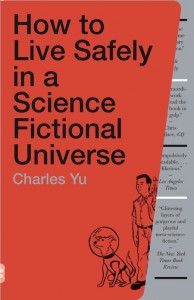 Charles Yu has blown my mind. Moments ago I finished his strange novel, How to Live Safely in a Science Fictional Universe. I was told it was a story about time travel. And it is. In a way. But at the same time it has nothing to do with time travel. In fact, I’d argue there is no time travel in the book.
Charles Yu has blown my mind. Moments ago I finished his strange novel, How to Live Safely in a Science Fictional Universe. I was told it was a story about time travel. And it is. In a way. But at the same time it has nothing to do with time travel. In fact, I’d argue there is no time travel in the book.
The narrative is the tale of Charles Yu, a Charles Yu who supposedly lives in an alternate universe in which “science” has been substituted with “science fiction.” Everything that can exist in science fiction, exists in this world: emotive computer programs, time machines, futuristic sidekick dogs. And one day, thanks to a time machine, Charles Yu meets Charles Yu and becomes stuck inside a time loop. Inside this time loop, Yu writes a book titled, How to Live Safely in a Science Fictional Universe.
The book is meta on a new scale.
But Yu’s idea of time travel is even more trippy when you get down to it, because in this universe, time travel does not require a DeLorean. Here, all you need is your mind. To travel through time is to alter your perception of time. With Déjà vu, we seem to be able to remember the present. Yu poses: if we can remember the present, why can’t we re-experience the past?
And that’s what we do everyday. We re-experience, that is we travel to, the past in our minds, replaying our most heart-wrenching memories over and over again. And sometimes we get stuck in a loop of our own making, reliving our mistakes when we should be embracing the anxiety and the unknown of our futures.
It is a tone poem. It is an exploration of the almost cosmic bond between the destinies of fathers and sons. But it’s also a fun riff on science fiction stories.
In the end, what the book is to me, I think, is a close representation of how our consciousness lives somehow outside the flow of time and only understands its passage when it tries to describe it.
“It collapses onto itself, like the present,” writes Yu, “which only appears when you think about it, like the text of a book.”
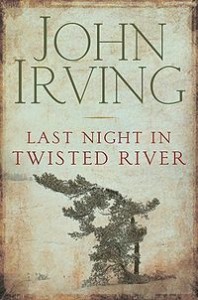 A John Irving novel is a different sort of animal. His books usually delve more deeply into a character than I’m used to. Most times the narrative is simply about the life of a particular character, some times from conception to death (Garp). His books take time to read, at least for me. And the stories don’t seem much like strict narratives as they do a series of experiences. But I love every minute of it, even if it’s heavy lifting.
A John Irving novel is a different sort of animal. His books usually delve more deeply into a character than I’m used to. Most times the narrative is simply about the life of a particular character, some times from conception to death (Garp). His books take time to read, at least for me. And the stories don’t seem much like strict narratives as they do a series of experiences. But I love every minute of it, even if it’s heavy lifting.
Irving always teaches you something. You can guess that, in life, he’s a curious type of guy and loves to share the insights that he’s gleaned from close study. In Last Night in Twisted River, he teaches about such seemingly detached subjects as logging, fine cooking, and, of course, the mechanics (and importance of) writing. Like in many Irving tales, there is much loss here but always grace, too.
This novel, to me, seemed like a return to the themes of Garp (my favorite Irving story), like an older artist coming back to an early style to show us what he’s learned in the years since. On the surface, it is the story of a man and his son on the run from a murderous North Country cop. But, like Garp, it’s also about how to navigate a life full of accidents. It’s truly wonderful and I already miss spending time with Danny and Ketchum and the cook.
I ear-marked a passage that I really love and wanted to share. It’s from near the end, but doesn’t give anything away. Here it is:
“We’ve been an empire in decline since I can remember,” Ketchum said bluntly; he wasn’t kidding. “We are a lost nation, Danny. Stop farting around.”
And what does he have to do with this odd film from 1976?
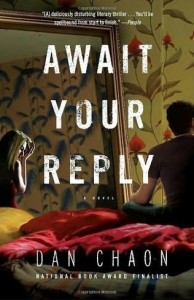 There’s nothing I love more than being surprised by a story. It doesn’t happen that often anymore. Movies, books, music, even the good ones, mostly are about what you expect when you’re getting into it. Every once in a while, something still surprises. And when it happens, I smile for weeks.
There’s nothing I love more than being surprised by a story. It doesn’t happen that often anymore. Movies, books, music, even the good ones, mostly are about what you expect when you’re getting into it. Every once in a while, something still surprises. And when it happens, I smile for weeks.
Await Your Reply is surprises all the way down. Being from NE Ohio myself, I had heard of this Dan Chaon character. An unassuming man quietly writing books in my back yard, teaching at Oberlin. I thought he wrote high-falutin’ stuff, American-family-distopia stuff. I don’t know who told me such lies. To be honest, I was finally moved to pick up one of his books because I’m desperately looking for fellow authors to “blurb” my debut novel. But I knew I was going to love this story from the synopsis.
Forget jerk-off elitist literary fare, this is a noir thriller written well. We are treated to three stories, told in alternating chapters. Each focusses on a character in search of an identity: a twin tracking his insane brother into the wastes of the arctic; a young man learning identity-theft from his estranged father; a demure young woman trying out a new life on the run with her former teacher. All great stories on their own.
And then, they begin to come together…
I’m not going to ruin anything about this read. You simply have to pick it up.
Await Your Reply is an exploration of what makes up our identity. And if we’re nothing more than compilation of memory, what do we become when we invent different histories? Can we ever truly reinvent who we are?
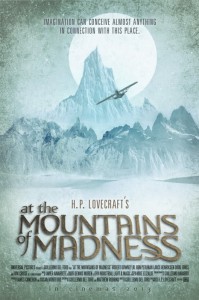 A group of scientists discover something alien frozen in the wastes of the South Pole; the idea is so overused, it has gone past cliche and into the realms of Metafiction. But it all started with this creepy story by Lovecraft, written in 1931 (unless you count the final pages of Edgar Allan Poe’s only novel, The Narrative of Arthur Gordon Pym of Nantucket, written in 1838, where Poe’s story bleakly hints at the land of the Old Ones.) At the Mountains of Madness is the inspiration for The Thing, the first X-Files movie, and countless episodes of The Twilight Zone and Outer Limits.
A group of scientists discover something alien frozen in the wastes of the South Pole; the idea is so overused, it has gone past cliche and into the realms of Metafiction. But it all started with this creepy story by Lovecraft, written in 1931 (unless you count the final pages of Edgar Allan Poe’s only novel, The Narrative of Arthur Gordon Pym of Nantucket, written in 1838, where Poe’s story bleakly hints at the land of the Old Ones.) At the Mountains of Madness is the inspiration for The Thing, the first X-Files movie, and countless episodes of The Twilight Zone and Outer Limits.
I had been aware of the story, and had a vague understanding of Cthulu cult, Old Ones, and Shoggoths, for some time, as they are name-dropped by just about every sci fi author or director of the last 50 years. I had been saving my introduction to Lovecraft for the appropriate moment and I figured I’d finally dive in before seeing this year’s The Thing prequel. It was perfect timing. There might not be a better story to read in NE Ohio during a gray and cold October.
The story, some 70 years old, still holds up. The language is archaic at times but this adds to a sense of period and place and is just a lot of fun to read. Pretty straight-forward plot: a group of scientists journey to the South Pole only to find a previously undiscovered mountain range with odd square-shaped buildings jutting from the peaks, suggesting some intelligent beings once lived there. Except, according to the present ground samples and glaciers, the buildings, if that’s what they are, must have been built millions of years before humans.
Not to ruin it for you, but eventually the scientists’ curiosity gets the better of them.
One structural novelty that would not get by editors today is the constant build-up by the narrator of what we’re about to read. Almost every chapter begins with, “I dread the things I’m about to share with you, but it’s important I share them so that no one else ventures to the South Pole.” Readers have no patience for that sort of throat-clearing today. Which is a shame, because it really adds some cool suspence.
If you haven’t already, check it out before the snow sets in.
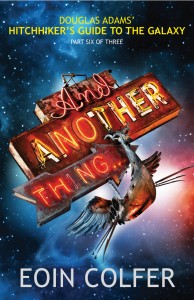 I LOVED the Hitchhiker’s Guide to the Galaxy as a kid. All five books in the trilogy. Discovering the story of Arthur Dent, Ford Prefect, Trillian, and Zaphod Beeblebrox, was an almost magical moment in my adolescence. Life changing. I knew it was something special from the moment two dangerous missiles honing in on the heroes’ ship were inexplicably turned into a whale and a potted plant. Ever since, I made sure to scan the shelves of the bookstore, wishing I might find a sixth book in the series. Even after Douglas Adams passed away, in 2001, I couldn’t help but continue looking. He was the sort of guy who might release yet another book after his death.
I LOVED the Hitchhiker’s Guide to the Galaxy as a kid. All five books in the trilogy. Discovering the story of Arthur Dent, Ford Prefect, Trillian, and Zaphod Beeblebrox, was an almost magical moment in my adolescence. Life changing. I knew it was something special from the moment two dangerous missiles honing in on the heroes’ ship were inexplicably turned into a whale and a potted plant. Ever since, I made sure to scan the shelves of the bookstore, wishing I might find a sixth book in the series. Even after Douglas Adams passed away, in 2001, I couldn’t help but continue looking. He was the sort of guy who might release yet another book after his death.
Turns out I was half right.
At the time of Adams’ death, he had begun to plot out another novel. From those notes, Eoin Colfer, wrote And Another Thing, which I somehow missed until I found it on a bargain bin at the Borders closeout sale in Cuyahoga Falls.
There’s a lot that’s good about this book. Colfer captures the absurd whimsy of Adams nicely, especially in the first 100 pages. Once again, Arthur and Ford must escape planet Earth before it is destroyed (once and finally for all) by Vogons. They are reunited with Trillian, as well as Trillian and Arthur’s emo daughter, Random, and, eventually Zaphod Beeblebrox, who is one head lighter than last we saw him. The crux of the story involves a colony of humans settling on a new planet and how, with the aide of Thor, Arthur and crew try to save them from the last wave of Vogons.
The middle, however, takes a long diversion into the POV of the colony’s leader as he interviews candidates for their new God and loses a little steam for a bit. Also, if I’m reading a Hitchhikers book, I want me some MARVIN! That depressive robot, my favorite character, was no where to be found. Sure, Adams killed him off in So Long And Thanks for All the Fish, but in a world of time travel and improbability drives, it’s not too hard to write him back in. If you can bring back Wowbagger, you can bring back Marvin!
Still…it was wonderful to return to the Heart of Gold and to see Arthur and company again. If you’re a fan, it’s definitely worth the read.




